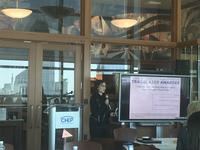Yih receives Trailblazer award
Yuehwern Yih, professor of industrial engineering, partnered with Indiana Community Health Partnerships (CHeP) to co-design visual cues for a smart pump drug limit library to improve patient safety. Her project is titled "Visual cues for smart pump drug limit library to improve patient safety".
CHeP's mission is to improve the health of Indiana residents through community-university partnerships. It is part of the Indiana CTSI, which seeks to improve the health of individuals and communities by supporting highest-quality research and partnerships by providing resources, services, training, education and funding opportunities.
CHeP gives Trailblazer Awards for collaborative research projects focused on topics that affect health equity, including but not limited to reducing substance misuse through innovative community-driven prevention approaches. These projects implement research that has the potential to identify or reduce health or health care inequities, or perform a needed evaluation of an existing health-related program that has the potential to affect health equity.
Others who worked on the project include Jee Eun (Jane) Hong, Master's student in industrial engineering; Jim Fuller, president, Indianapolis Coalition for Patient Safety; Todd Walroth and Andrew Fritschle-Hilliard, pharmacists, Eskenazi Health; Denny Yu, assistant professor in industrial engineering; and Poching DeLaurentis, research scientist from Regenstrief Center for Healthcare Engineering.
ABSTRACT
This project focuses on the timely update of the drug limit library (DLL) for smart infusion pumps to improve patient safety. Smart pumps and use of DLLs are widely used to prevent medication dosing errors in the U.S. However, it may take 20 to 150 days to wirelessly update all the pumps in a facility, which puts patients at risk for improper dosing, so it is essential to improve this process.
The objective of this project is to form a community-academic partnership to co-design visual cues on smart pumps employing user-centered design principles considering usability and frontline stakeholders’ workflow to increase their awareness about updating DLLs. Visual cues will be able to prompt frontline stakeholders to (1) renew the out-of-date DLL, or (2) choose an updated smart pump. The expected outcomes include (1) shortened update cycles of DLLs, and (2) perceived usefulness and effectiveness of the intervention on the workflows of DLL updates.
We have designed and implemented the visual cues. The intervention group outperformed the control group consistently in four consecutive update cycles in both speed of the updates as well as the percentage of pumps competed the updates. The community partner continues to use our visual cues after the completion of the study as part of its standard pump update processes. We are looking for opportunities to expand this idea to a larger scale implementation.

